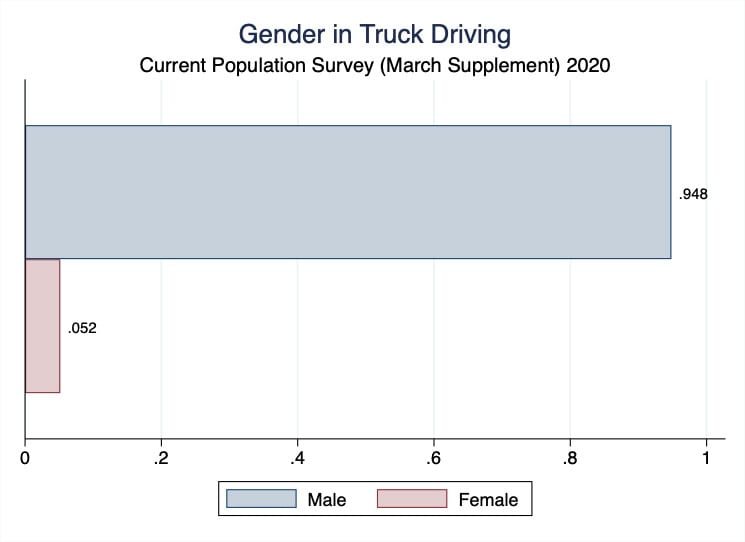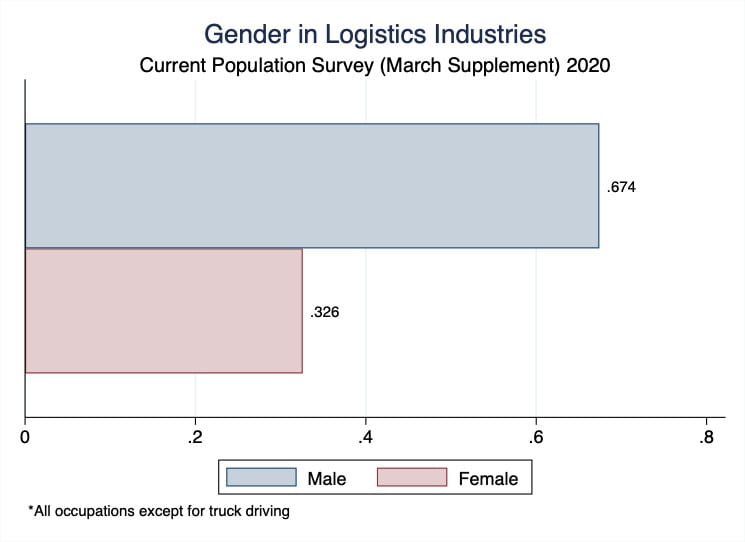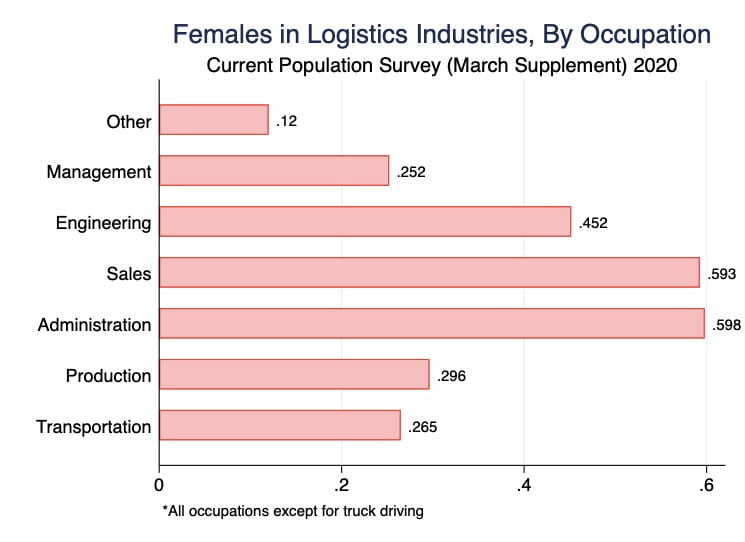
Bentonville think tank Heartland Forward recently released an economic recovery strategy, commissioned by the Governor’s Task Force for Economic Recovery. The report highlights supply chain management and the related fields of logistics and transportation as areas of strength that Arkansas should build upon. It also identifies women’s labor force participation rate of 69.6% – 44th in the nation and eight percentage point below men’s – as an area for improvement.
This article brings those two elements of the report together by examining women’s current participation in supply chain jobs, outlining the benefits of bringing more women into the supply chain workforce, and suggesting ways to achieve that goal.
How Many Women Work in Supply Chain?
“Supply chain” covers a lot of ground. It includes many industries and a range of blue-collar and white-collar work. Women tend to be underrepresented throughout.
An extreme example involves trucking, the backbone of most supply chains. Roughly 5% of truck drivers are women, illustrating a broader trend of women being far better represented in white-collar work than in blue-collar jobs.

When we remove trucking from the equation, female representation in supply chain goes up. But women remain a minority. The following graph compares male and female representation in Warehousing and Transportation (Air, Water, Rail, and non-driving jobs in Trucking).

When we look at the types of jobs women hold in those industries, we see that they hold most Administration and Sales jobs. But only 25% of supply chain managers are women. Managers generally make higher salaries than salespeople and office administrators, so women are underrepresented in the better-paid supply chain jobs and overrepresented elsewhere.

Though the graphs above paint a fairly grim picture, they represent a considerable recent uptick in the number of women in supply chain. Researchers Alex Scott and Beth Davis-Sramek find that the number of female truck drivers increased 23.1% between 2010 and 2019. Research firm Gartner finds that female representation in the overall supply chain workforce has grown 6% since 2016.
Women’s continued minority status in many supply chain roles reflects the persistence of the stereotype that most supply chain jobs are “men’s work.”
Historically, men were hired to fill entry-level, hands-on blue-collar jobs that allowed some to stand out, gain new responsibilities, climb the company ladder, and attain management positions. Meanwhile, women were hired for administrative, sales, and marketing jobs that typically offered no such path for advancement.
Recent trends have weakened this narrative. Many “hands-on” tasks have been automated; managerial positions tend to require a college degree; firms, industry associations, and universities have actively recruited more women into supply chain; and more women have pursued both blue-collar and white-collar supply chain jobs.
But, as the above graphs illustrate, there’s still plenty of work left to make supply chain more equitable. Doing so will benefit the state, its businesses, and its people.
Why Gender Diversity Matters
For Arkansas
Bringing more women into the state’s workforce – in supply chain or elsewhere – would yield considerable benefits.
At the macroeconomic level, studies show that more female workforce participation strengthens an economy. In part, this is simply because it adds more workers to the labor pool, boosting overall productivity.
Research also shows that men and women typically possess different skills and perspectives. For instance, women tend to be more risk-averse, better at multi-tasking, and more open to collaboration. So, women bring skills and perspectives that complement those men typically exhibit, facilitating problem-solving and further boosting productivity.
One interesting result of this increased productivity is that men’s wages also rise. So, all Arkansans would likely benefit from Heartland Forward’s proposal of pursuing greater female workforce participation.
For Companies
At the firm level, numerous studies attest to gender diversity’s benefits.
For example, a study of retailers – which have a strong supply chain component – shows that gender diverse business units in those firms have 14% higher revenue than their less diverse counterparts.
Another study finds that firms with high levels of gender diversity among their executives are 25% more likely to have above-average financial performance than those with low levels of gender diversity.
A third study finds that research and development teams with high levels of gender diversity are more likely to introduce radical innovations into the market. It’s hard to overstate the value of this benefit of gender diversity in supply chain management, where ongoing innovations in areas like digitization and automation are fundamentally changing how supply chains are managed.
Those are only a few of the benefits of gender diversity that researchers have identified. There are dozens more. Research also shows that female jobseekers prefer companies with higher levels of gender diversity. So, hiring women attracts other talented women to a company, further amplifying gender diversity’s benefits.
For Individuals
Supply chain jobs tend to be satisfying, well-paid jobs. So, more gender diversity in supply chain would benefit many women, their families, and their communities.
Expanding the white-collar female supply chain talent pool would inevitably allow more women to become high-level managers and executives, reaping the financial and personal benefits those positions offer.
Blue-collar jobs can also provide tremendous opportunities for women. For example, truck driving offers great wages and stable work compared to other jobs that do not require a college degree. Admittedly, many women with families would not pursue a career in trucking because most entry-level positions require drivers to be away from home for extended periods. But, for some women, a trucking career could be very satisfying.
What Can Be Done?
Support Organizations
Given women’s underrepresentation in supply chain, it is important that they have opportunities to network, develop leadership skills, learn from other women in the field, and connect with mentors. Groups like AWESOME (Achieving Women’s Excellence in Supply Chain Operations, Management, and Education) and WISE (Women Impacting Supply Chain Excellence) provide those opportunities.
WISE was founded as a Walton College student organization in 2012. The group has grown considerably under the recent leadership of Dr. Stephanie Thomas, gaining members and hosting annual events and programs.
In 2019, 50 students and 15 professors from 12 universities attended the first WISE Future Leaders Symposium. Keynote speaker Shelley Simpson – Executive Vice President, Chief Commercial Officer, and President of Highway Services for J.B. Hunt – highlighted WISE’s importance:
When I was in college, it was hard to imagine what my job would be like when I graduated. The Supply Chain Symposium gives young women an inside view of different areas and companies where they can put their skills to work. Stephanie is a fantastic leader and has the know-how to bring together academia and business… I have a huge passion for bringing more women into supply chain, allowing them to reach their potential in a rewarding career.
Heartland Forward’s report recommends “considering the creation of a statewide women-focused mentoring network.” Providing additional support to WISE and similar groups would certainly be compatible with that recommendation.
Supply Chain Cluster Initiative
The report also calls for a statewide supply chain cluster initiative that would help Arkansas build on its economic strengths by “growing more small and medium-sized logistics, supply chain and transportation firms throughout the state’s diverse regions.”
Should policymakers enact that initiative, it would make sense to use the newly created jobs to help advance the report’s recommendations on bringing more women into the Arkansas workforce.
Marketing, Outreach, and Recruitment
The supply chain cluster initiative could help bring more women into the labor pool if linked with another Heartland Forward recommendation: “celebrate the successes of Arkansas women through marketing and communications campaigns.” Such campaigns could highlight the achievements of Arkansas women in both blue-collar and white-collar supply chain work, leading more women to consider careers in male-dominated areas.
Relatedly, university supply chain departments could work with local elementary and secondary school principals, counselors, and teachers to raise awareness of supply chain as a career path.
Most Arkansas students enter college with little or no exposure to the field.
“Supply chain management was definitely not talked about in my high school,” says Walton College supply chain student and Conway High School graduate Mary Pham, who learned about the subject while researching colleges. Bentonville High School graduate and Walton College supply chain student Samantha Keiser has long known about the field because of its high profile in Northwest Arkansas. But, though her high school “offered a couple of business courses, supply chain was not one of them.” Reagan White, a Farmington High School graduate in her Junior year at the University of Arkansas, notes that she “first learned about supply chain management during a Spring 2020 Honors course called ‘Pandemic,’ which brought in guest speakers to highlight different industries and fields that had been affected by COVID-19… I decided to switch my major to supply chain management after hearing about and witnessing firsthand the expansive impacts that supply chains have on everyday life within various industries.’”
By partnering with schools, universities could send representatives to career fairs, produce educational videos, and suggest opportunities to integrate elements of supply chain management into the curriculum, thereby elevating awareness of both the field itself and the important roles women play in it.
Supply chain firms can also help by making gender diversity a company goal. The 2021 Gartner/AWESOME Women in Supply Chain Survey shows that many companies are doing just that. Among respondents whose employers have formal diversity goals, 68% said their firm has an initiative that specifically targets women. That’s 22% higher than the 2020 survey and a very promising sign for the future of women in supply chain.







